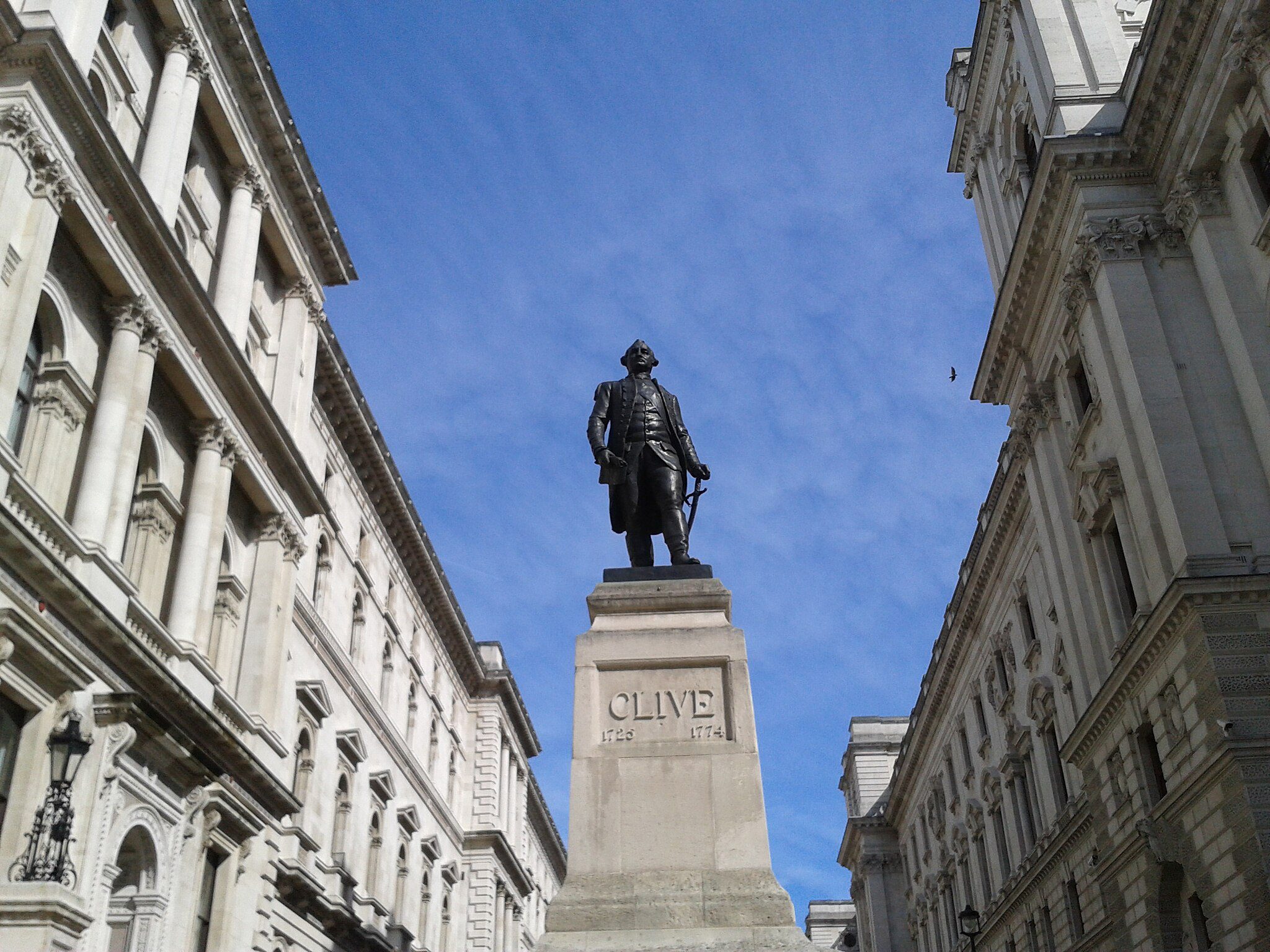In this essay, I will locate the question of corruption around UK arms sales to Saudi Arabia within the broader political economy of UK relations with the Gulf Arab monarchies. The history and political economy of these ties have much to tell us about how precisely Britain fits into the world system as a modern capitalist power. The ways in which questions of corruption are handled politically by the British government provides some insight into the nature and balance of interests at stake.
This essay draws exclusively on research conducted for my book AngloArabia: Why Gulf Wealth Matters to Britain, and all sources are cited there. Hence I have not included a bibliography.
***
British imperial forces first entered the Persian-Arabian Gulf in the early nineteenth century, establishing a wider buffer zone to exclude rival powers from its Indian possessions. A treaty network of local client rulers developed under British tutelage into the Gulf state system that we know today. When the House of Saud conquered much of the Arabian peninsula in the early twentieth century, imposing its unique brand of puritanical rule, the British were on hand to provide decisive economic and military support.
As oil became the lifeblood of the industrialised world economy, the vast reserves of the Gulf region attained the status of a major strategic prize in great power competition. Britain and the US worked to shore up the local monarchs against the threat of nationalist challenges that drew their strength from a popular appetite for economic justice and geopolitical independence. This extensive collaboration between global north powers and local elites, through the crucial years of state formation up to and including the present day, does more to explain the persistence of authoritarian rule in the region than casual and simplistic references to cultural difference between the ‘West’ and the ‘East’.
The 1973-74 oil crisis marks the beginning of the current chapter of UK-Gulf relations. As the monarchies took control of oil production, and as revenues skyrocketed, Britain worked its long-standing alliances to ‘recycle’ these ‘petrodollars’ to its own benefit, in various ways. The post-2000 oil price boom deepened and developed that relationship further, and although that boom has since petered out to a degree, Gulf petrodollars retain serious strategic value to the UK as a major capitalist power in the world system.
Britain’s chronic and growing current account deficit, a symptom of its adoption of the neoliberal economic model, is mirrored by the current account surpluses of its Gulf allies and the resulting vast reserves of sovereign wealth. Petrodollar investment plays a major role in financing that deficit and stabilising a pound sterling that is increasingly vulnerable in the context of Brexit. The UK financial services industry’s appetite for Gulf capital is matched by the Gulf elites’ desire to strengthen ties with their global north allies, particularly in the wake of the Arab uprisings. Notable events from the purchase of Manchester City football club to the 2008 Qatari-Emirati rescue of Barclays Bank should be seen in this wider context. Meanwhile, British exporters have been actively assisted by the government in taking advantage of the consumer and infrastructure boom in the Gulf, now the UK’s leading global south export market with which it runs a rare trade surplus, thus reducing somewhat the overall deficit on the current account.
British ‘free market’ capitalism has therefore developed, in part, in symbiotic relationship with authoritarian Gulf rentierism. These petrodollars flow to the UK not only because it has the world-leading financial industry to absorb and process them, but also because Gulf elites know that Britain is one of a tiny few major powers that they can rely upon to ensure their survival. Britain’s key strategic aim after World War Two – to remain a global power in spite of imperial decline – rests to a high degree on its rare ability to project military power on an intercontinental basis. This in turn requires a domestic military industrial base, which has become increasingly reliant economically on major export orders. Those orders have been drying up everywhere since the Cold War ended, except, that is, for the Gulf, which now accounts for around half Britain’s military exports.
High profile exports such as the military jets now pulverising Yemen form part of a wider relationship of military cooperation encompassing the arming and training of human rights abusing security forces, and a series of extensive defence commitments to the regimes. Britain’s de facto support for the violent crushing of a peaceful and broad-based pro-democracy movement in Bahrain in 2011 was a striking example of the strength of its commitment to the conservative regional order. Its active enabling of the man-made catastrophe in Yemen is another.
***
The most important case in which the question of corruption illuminated the nature of Britain’s relationship with the Gulf monarchies relates to the Serious Fraud Office’s investigation into alleged bribes paid by BAE Systems to the Saudis to lubricate arms deals. The way this episode unfolded, and the way it was handled by the British government, tells us a great deal, not only about how highly the alliance with Riyadh is valued and the lengths to which politicians will go to protect it, but also about how that relationship is weighed in the balance against the state’s other core priorities. The SFO episode showed that the British government was prepared to contradict the wishes of both Washington and major players in the City of London in order to protect commercial dealings with the Saudis from scrutiny and the relationship with Riyadh from serious damage. The episode is covered in depth in Nicholas Gilby’s excellent book on corruption allegations around UK arms sales, Deception in High Places: A History of Bribery in Britain’s Arms Trade. Here, I will pick up the key points and add some observations relevant to the remit of the present memo.
In 2003, The Guardian reported that the top civil servant at the Ministry of Defence had ‘failed to follow up for two years allegations that … BAE Systems ran a slush fund designed to bribe Saudi officials … prevented the MoD’s fraud squad investigating the case, and withheld the SFO’s warnings [about the alleged bribery] from the defence secretary.’
The Saudis suspended talks over the purchase of Eurofighter Typhoon jets in November 2006 after the continuing SFO investigation began looking into Swiss bank accounts as part of its investigation. Meanwhile the Defence Industries Council, a body representing leading arms firms, wrote to the defence secretary, not referencing their concern over the SFO probe directly but talking in general terms about the importance to them of the Gulf market. However, pressure from key constituencies was not all coming from the same direction. In December 2006, the Independent on Sunday reported that, in July 2002, the US assistant secretary of state for economic and business affairs, E. Anthony Wayne, had pressed MoD officials to investigate thoroughly what the Americans regarded as ‘a longstanding, widespread pattern of bribery allegations involving BAE’.
The key moment came on 14 December 2006, when the attorney general, Lord Goldsmith, announced in Parliament that the SFO has decided to call off the probe. He quoted the SFO’s official statement, which said:
This decision has been taken following representations that have been made both to the Attorney General and to the [SFO] Director concerning the need to safeguard national and international security. It has been necessary to balance the need to maintain the rule of law against the wider public interest. No weight has been given to commercial interests or to the national economic interest.
Goldsmith went on to say that he had consulted the prime minister and the foreign and defence secretaries who expressed the clear view that continuation of the investigation would cause serious damage to UK/Saudi security, intelligence and diplomatic co-operation, which is likely to have seriously negative consequences for the United Kingdom public interest in terms of both national security and our highest priority foreign policy objectives in the Middle East. The heads of our security and intelligence agencies and our ambassador to Saudi Arabia share this assessment.
The SFO had reportedly been lobbied to drop the probe by the prime minister, the foreign and defence secretaries, the heads of the security and intelligence agencies, and the British ambassador to Saudi Arabia, while BAE had been running a media and lobbying campaign warning that Saudi Arabia could pull the plug on negotiations for the Typhoon deal and instead purchase Rafale jets from France. Prime Minister Blair in turn had been lobbied vigorously by the Saudi government. According to The Observer, ‘Saudi Arabia threatened to stop sharing vital intelligence – particularly intercepted communications between al-Qaeda members active there’ – unless the SFO probe was called off. ‘Senior Whitehall sources said the Saudis warned they would also kick out British military and intelligence personnel based in the country.’
However, as noted above, not all of the pressure went in this direction. F&C Asset Management, one of Britain’s biggest institutional investors, wrote to the defence procurement minister warning that the decision to halt the SFO investigation could undermine the integrity of UK financial markets. F&C at the time held more than £100 billion under management and noted that, as a BAE shareholder, it would benefit from the decision in a narrow, immediate sense. Nevertheless, it expressed serious concern at the broader implications this decision could have for the efficient functioning of financial markets as a whole:
We believe that, for long term investors, bribery and corruption distort and destabilise markets, expose companies to legal liabilities, disadvantage non-corrupt companies and reduce transparency for investors seeking investment opportunities … There is a danger that the government’s recent action will be perceived as undermining the consistent application of the UK’s national legislation governing corrupt practices.
Similar concerns were expressed by the major institutional investor, Morely Fund Management, and the UK’s biggest pension fund, Hermes, whose chief executive Mark Anson warned Blair that ‘lack of credibility in the regulation of one company can spread to the rest of the stock market creating higher risk premiums and cost of capital … bribery wastes business profits.’ It bears emphasising that this opposition came not from marginal pressure groups but major players in arguably the key sector of Britain’s political economy: the financial services industry. The fact that the government was prepared to go against these interests, and to risk the costs to the City of London that they described, is an indication of how much weight was given to the relationship with Saudi Arabia and the potential effect of allowing the SFO investigation to run its course.
It then emerged that Saudi threats to British security described in press reports at the time the SFO probe was called off may have been overstated. Whitehall sources told The Guardian that MI6 and MI5 possessed no intelligence that the Saudis intended to sever security links. They had simply been asked hypothetically whether it would be damaging to UK national security if such a breach did happen and replied that, naturally, it would. The head of MI6 then reportedly refused to sign up to a dossier stating that it ‘endorsed’ Blair’s national security claim, in support of the government’s response to concerns raised by the OECD on its handling of the issue. If the Saudis had not in fact made these threats, this directly contradicted what the UK ambassador to Saudi Arabia had told the SFO director, according to sources who spoke to the Financial Times.
The attorney general had said in his statement that commercial or economic interests were not the grounds for the decision to call off the SFO. If the claimed national security grounds were not the real reason either, then it may be reasonable to conclude by process of elimination that it was the strategic relationship with Saudi Arabia as it pertained to Britain’s global role, not to the security of its citizens, that the government was prepared to go to such extraordinary lengths to protect.
However, there was another potential reason for the decision. The Financial Times reported in January 2007 that, before it was abandoned, the SFO probe ‘had widened to examine whether Ministry of Defence staff were aware of commission payments to Saudi Arabian officials, according to sources familiar with the investigation.’ These allegedly included secret payments paid to Saudi Prince Bandar bin Sultan bin Abdulaziz Al Saud, head of the Saudi National Security Council, amounting to £30 million every quarter for at least ten years. This was done, said The Guardian, ‘with the knowledge and authorisation of Ministry of Defence officials under the Blair government and its predecessors’. The aborted SFO inquiry was understood to have uncovered these payments. ‘[A]ccording to those familiar with the discussions at the time [of the decision to call off the inquiry], Lord Goldsmith had warned colleagues that British “government complicity” was in danger of being revealed unless the SFO’s corruption inquiries were stopped.’ Bandar himself ‘categorically denied’ the allegation made in The Guardian’s report.
The sale of the Typhoon jets was eventually finalised once the worst of the controversy over the quashed SFO investigation had died down. However, the US embassy in London made a formal protest over the decision to drop the investigation.
In February 2008, a British high court judge hearing a legal challenge to the scrapping of the inquiry noted: ‘I have seen nothing to suggest that anyone [in the British government] did anything but roll over’ in response to the pressure allegedly coming from the Saudi side. The court later ruled that the decision to call off the investigation was unlawful: ‘There is no evidence … that any consideration was given as to how to persuade the Saudis to withdraw the threat, let alone any attempt made to resist the threat … It is obvious … that the decision to halt the investigation suited the objectives of the executive [the government]. Stopping the investigation avoided uncomfortable consequences, both commercial and diplomatic.’
However, three months later the House of Lords overturned the high court’s ruling. The Law Lords (then the UK equivalent of a supreme court) said that the courts have no power to interfere with the SFO decision. Lord Bingham stated that ‘The [SFO] director was confronted by an ugly and obviously unwelcome threat … The director’s decision was one he was lawfully entitled to make … It may indeed be doubted whether a responsible decision-maker could, on the facts before the director, have decided otherwise.’
Putting aside the question of whether or not the decision to abandon the SFO probe was lawful, the assessment of the high court about the British government’s conduct during the episode is of more relevance to an analysis of UK–Saudi relations. The court appeared to take the view, contradicting the intelligence sources cited by The Guardian, that the security threats from the Saudis were real. But it also concluded that the government had made no challenge to those threats, effectively because they suited its own interests. If this is correct, then it is less a case of the Saudis blackmailing the British state over the security of its citizens and more one of the Saudis and the British government together placing extreme pressure on the Serious Fraud Office.
What is harder to answer is the question of whether these extraordinary measures were taken to protect the UK–Saudi relationship, to protect the UK government on the question of corruption, or some balance of both these considerations. Either way, in the government’s eyes, those concerns were deemed sufficiently grave to make the political fallout from the decision, and the opposition it elicited from a range of key power centres, a price worth paying.
***
Three potential conclusions can be drawn from this episode. First, the rejection of serious concerns raised by major institutional investors in the City of London about the government’s approach indicates that, within British capitalism, the state retains its own strategic interests and priorities distinct from, and sometimes overriding, those of significant sectors of capital. Second, in terms of the US-UK relationship and Washington’s stance on the corruption issue, the British state, again, retains its own interests and pursues its own path when deemed necessary. Third, the British government’s handling of the supposed security threat emanating from the Saudi response to the corruption allegations – which threat the UK appears, to all intents and purposes, to have positively welcomed – undermines the impression often given by ministers that they have no choice but to accede to Saudi demands. These findings are consistent with my wider conclusions about the role, power and priorities of the British state within the wider political economy of its relations with the Gulf Arab regimes.
Dr David Wearing is a Teaching Fellow in International Relations at Royal Holloway, University of London. His book, ‘AngloArabia: Why Gulf Wealth Matters to Britain’ is published by Polity.




